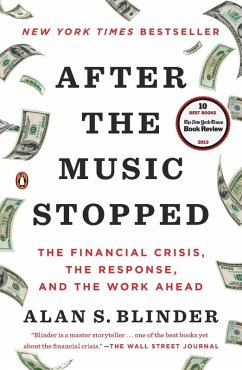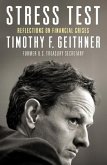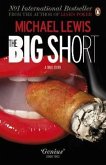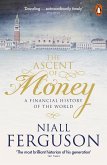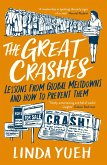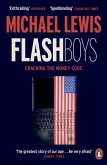The New York Times bestseller
"Blinder's book deserves its likely place near the top of reading lists about the crisis. It is the best comprehensive history of the episode... A riveting tale." - Financial Times
One of our wisest and most clear-eyed economic thinkers offers a masterful narrative of the crisis and its lessons.
Many fine books on the financial crisis were first drafts of history books written to fill the need for immediate understanding. Alan S. Blinder, esteemed Princeton professor, Wall Street Journal columnist, and former vice chairman of the Federal Reserve Board, held off, taking the time to understand the crisis and to think his way through to a truly comprehensive and coherent narrative of how the worst economic crisis in postwar American history happened, what the government did to fight it, and what we can do from here mired as we still are in its wreckage.
With bracing clarity, Blinder shows us how the U.S. financial system, which had grown far too complex for its own good and too unregulated for the public good experienced a perfect storm beginning in 2007. Things started unraveling when the much-chronicled housing bubble burst, but the ensuing implosion of what Blinder calls the bond bubble was larger and more devastating. Some people think of the financial industry as a sideshow with little relevance to the real economy where the jobs, factories, and shops are. But finance is more like the circulatory system of the economic body: if the blood stops flowing, the body goes into cardiac arrest. When America s financial structure crumbled, the damage proved to be not only deep, but wide. It took the crisis for the world to discover, to its horror, just how truly interconnected and fragile the global financial system is. Some observers argue that large global forces were the major culprits of the crisis. Blinder disagrees, arguing that the problem started in the U.S. and was pushed abroad, as complex, opaque, and overrated investment products were exported to a hungry world, which was nearly poisoned by them.
The second part of the story explains how American and international government intervention kept us from a total meltdown. Many of the U.S. government s actions, particularly the Fed s, were previously unimaginable. And to an amazing and certainly misunderstood extent, they worked. The worst did not happen. Blinder offers clear-eyed answers to the questions still before us, even if some of the choices ahead are as divisive as they are unavoidable. After the Music Stopped is an essential history that we cannot afford to forget, because one thing history teaches is that it will happen again.
"Blinder's book deserves its likely place near the top of reading lists about the crisis. It is the best comprehensive history of the episode... A riveting tale." - Financial Times
One of our wisest and most clear-eyed economic thinkers offers a masterful narrative of the crisis and its lessons.
Many fine books on the financial crisis were first drafts of history books written to fill the need for immediate understanding. Alan S. Blinder, esteemed Princeton professor, Wall Street Journal columnist, and former vice chairman of the Federal Reserve Board, held off, taking the time to understand the crisis and to think his way through to a truly comprehensive and coherent narrative of how the worst economic crisis in postwar American history happened, what the government did to fight it, and what we can do from here mired as we still are in its wreckage.
With bracing clarity, Blinder shows us how the U.S. financial system, which had grown far too complex for its own good and too unregulated for the public good experienced a perfect storm beginning in 2007. Things started unraveling when the much-chronicled housing bubble burst, but the ensuing implosion of what Blinder calls the bond bubble was larger and more devastating. Some people think of the financial industry as a sideshow with little relevance to the real economy where the jobs, factories, and shops are. But finance is more like the circulatory system of the economic body: if the blood stops flowing, the body goes into cardiac arrest. When America s financial structure crumbled, the damage proved to be not only deep, but wide. It took the crisis for the world to discover, to its horror, just how truly interconnected and fragile the global financial system is. Some observers argue that large global forces were the major culprits of the crisis. Blinder disagrees, arguing that the problem started in the U.S. and was pushed abroad, as complex, opaque, and overrated investment products were exported to a hungry world, which was nearly poisoned by them.
The second part of the story explains how American and international government intervention kept us from a total meltdown. Many of the U.S. government s actions, particularly the Fed s, were previously unimaginable. And to an amazing and certainly misunderstood extent, they worked. The worst did not happen. Blinder offers clear-eyed answers to the questions still before us, even if some of the choices ahead are as divisive as they are unavoidable. After the Music Stopped is an essential history that we cannot afford to forget, because one thing history teaches is that it will happen again.

Alan Blinder analysiert die Entwicklung in Amerika
Alan Blinder lehrt Ökonomik an der Princeton University, hatte Präsident Clinton in Wirtschaftsfragen beraten und war in den neunziger Jahren auch in leitender Position bei der amerikanischen Zentralbank tätig. Jetzt hat er eine Analyse der Finanzmarktkrise vorgelegt, die sich um eine sowohl theoretische als auch allgemein verständliche Erklärung des Geschehens bemüht. Der Leser wird merken, dass Blinder politisch der Demokratischen Partei und theoretisch dem keynesianischen Lager zuzurechnen ist. Das Buch besteht aus fünf Teilen, wovon der erste Teil die Fragestellung entwickelt, der zweite die Finanzmarktkrise analysiert, der dritte die staatlichen Gegenmaßnahmen, der vierte die Reformansätze und der letzte Zukunftsfragen, wie den Ausstieg aus der lockeren Geldpolitik.
Im zweiten Teil betont Blinder ein Übermaß an Komplexität und Fragilität - zu wenig Eigenkapital, zu viel Hebelwirkung, was in guten Zeiten die Eigenkapitalrendite erhöht - auf den Finanzmärkten und ein Defizit an Regulierung. Im Gegensatz zu Autoren wie John Taylor weist er die These zurück, dass die Niedrigzinspolitik wesentlich zur späteren Krise beigetragen habe. Die Blase auf dem Häusermarkt und ein Übermaß an Krediten ohne Rücksicht auf die Zahlungskraft der Kreditnehmer hätten über Verbriefungen und Derivative zu einer Blase geführt.
Ein Beispiel für die Regulierungsdefizite ist, dass niemand etwas dagegen getan hat oder in Anbetracht der Rechtslage tun konnte, dass die Versicherung AIG an mehr Kunden Versicherungen gegen Zahlungsausfall (CDS) verkauft hatte, als AIG im Versicherungsfall bezahlen konnte, denn die Zahlungsausfallrisiken hingen weitgehend vom Ende der Blase auf dem amerikanischen Häusermarkt ab. Nach der Rettung der Investmentbank Bear Stearns enttäuschte der Staat mit dem Verzicht auf die Rettung von Lehman Brothers die Finanzmärkte. Das Wachstum brach ein, die Arbeitslosigkeit nahm zu, Aktien verloren an Wert. Mit einer Vielzahl von Liquiditätshilfen kämpfte die Fed dagegen an.
Im dritten Teil wird die staatliche Rettungspolitik beschrieben. Das Programm Tarp sollte zunächst den Kauf von toxischen Wertpapieren finanzieren, auch Hausbesitzern in Schwierigkeiten helfen, wurde dann aber hauptsächlich zur Rekapitalisierung von Banken eingesetzt - nicht nur auf deren Wunsch. Der Kongress hatte zwar maximal 700 Milliarden Dollar bereitgestellt, aber mehr als 430 Milliarden wurden nie ausgezahlt. Mehr als 360 Milliarden Außenstände hatte der amerikanische Fiskus zu keinem Zeitpunkt. Weil das Programm - je nach Berechnung - auf einen kleinen Verlust oder einen Gewinn um die 25 Milliarden hinauslief, erklärt Blinder es zu einem großartigen Erfolg.
Ähnlich sieht er den fiskalischen Stimulus von 2009 über 787 Milliarden Dollar. Je ein Drittel des Programms bestand aus Steuersenkungen, um den Konsum zu stärken, zusätzlichen Staatsausgaben des Bundes und Hilfe an die Einzelstaaten und Lokalregierungen, damit diese nicht in der Krise ihre Ausgaben kürzen mussten. Blinder berichtet von Schätzungen, wonach jeweils zusätzliche 100 000 bis 170 000 Dollar Staatsausgaben einen Arbeitsplatz geschaffen oder gerettet haben. Die Ausdehnung der Zentralbankbilanz in der Krise war für Blinder eine Notwendigkeit, Inflationsfurcht vorerst abwegig.
Gerade weil die staatlichen Rettungsmaßnahmen nach Blinder eine Depression, wie in den dreißiger Jahren, statt "nur" eine langwierige Rezession mit hartnäckig hoher Arbeitslosigkeit verhütet haben, fragt er sich im vierten Teil, wie so viel Erfolg von so viel Verlust an Vertrauen in Staat und Politik begleitet werden konnte. Dieser Vertrauensverlust könnte die Handlungsfähigkeit des Staates bei künftigen Krisen gefährden. Ohne die Rettungsmaßnahmen hätte die Anzahl der Arbeitsplätze fast 10 Millionen geringer sein können.
Im fünften Teil analysiert Blinder, wie und unter welchen Bedingungen sich die Fed von der lockeren Geldpolitik verabschieden könnte und ihre Bilanz reduzieren. Das macht ihm weit weniger Sorgen als die staatlichen Defizite und Schulden. Ohne Begrenzung der staatlichen Gesundheitsleistungen kann das seines Erachtens nicht funktionieren, ohne Steuererhöhungen auch nicht. Damit ist kräftige Opposition aus unterschiedlichen Gründen, aber aus beiden Parteien, garantiert.
Von der Vielzahl der Empfehlungen und Ratschläge will ich nur die Forderungen nach mehr Eigenkapital und Einfachheit im Finanzwesen und Konzentration auf wenige Ziele in der Politik herausgreifen. Das Buch vertritt einen klaren Standpunkt und argumentiert überzeugend. Etwas zu kurz kommt die Auseinandersetzung Blinders mit fachlichen Widersachern wie John Taylor. Aber die vielen Erläuterungen diffiziler Fachbegriffe und Sachverhalte sind hervorragend. Wer nicht weiß, wie man mit Derivaten synthetische Hebelwirkung erzeugen oder Risiken schaffen kann, wird nach der Lektüre klüger als vorher sein.
ERICH WEEDE.
Alan Blinder: After the Music stopped.
Penguin Press, New York 2013, 496 Seiten, 29,95 Dollar
Alle Rechte vorbehalten. © F.A.Z. GmbH, Frankfurt am Main
The Wall Street Journal:
"[Blinder] is a master storyteller... [After the Music Stopped] is one of the best books yet about the financial crisis."
Michiko Kakutani, The New York Times:
"Highly readable... Mr. Blinder draws on the work of many... reporters in his account. But if large portions of After the Music Stopped feel familiar, the book nonetheless benefits from its wide-angle perspective, as well as from its vantage point in time, now that it's possible to assess the fallout of decisions that were being made on the run by White House and Treasury officials under extraordinary pressures. It also benefits from Mr. Blinder's clear-eyed prose and nimble gifts as an explainer gifts that sometimes approach those of Bill Clinton, when it comes to making complicated economic issues and policies understandable to the lay reader. Direct and concise, Mr. Blinder tells it as he sees it."
Financial Times:
"Blinder's book deserves its likely place near the top of reading lists about the crisis. It is the best comprehensive history of the episode... A riveting tale."
The New Republic:
"For a reader wondering how we got here, and why the people in charge have seemed, often, to be so chary of stringing up the culprits, or tearing down the system, Blinder's book - not least because his fair-minded approach and pragmatic mindset evokes that of America's current regulators - gives us an invaluable insight."
USA Today:
"What does all the knowledge mean to generalist readers? A lot, actually. Blinder is no defender of his economist colleagues or other former and current insiders who caused so much damage - or, at minimum, failed to see the collapse on the horizon. He writes clearly - as well as lots of journalists. That combination makes the book a worthy addition to the literature."
Seattle Times:
If you want to get between the covers with your favorite econ nerd this season, I recommend Alan Blinder s After the Music Stopped: The Financial Crisis, the Response and the Work Ahead. Written by the former vice chairman of the Federal Reserve, this deserves a place among the top reads on the Great Panic and its aftermath.
Cleveland Plain Dealer:
"A prodigiously detailed yet generally accessible investigation of the roots of the meltdown, its multiple and continuing reverberations in the United States and globally, and the short-term fixes and long-term remedies required to treat, and then heal, the patient."
President William J. Clinton:
"If you want to understand every aspect of our economic crisis how we got into it, how we escaped a depression, why we haven't fully recovered, and what we have to do now read this book. It's a masterpiece simple, straightforward and wise."
Paul A. Volcker:
"True to his scholarly roots and informed by his practical insights, Alan Blinder has produced in After the Music Stopped both a comprehensive and, mirabile dictu, engagingly readable analysis of the great financial crisis. Whether or not one agrees with every particular judgment, the force of the argument is clear: here we are, four years later, still short of reforms that are needed."
Bob Woodward:
"Alan Blinder is one of the world's best informed and most balanced, sensible economists. His credentials include years as a senior adviser in the Clinton White House, then as vice chairman of the Federal Reserve and as regular op-ed contributor to the Wall Street Journal. After the Music Stopped is the best account available of what really happened in the 2008 financial crisis, why and what it now means for the future."
Mohamed A. El-Erian:
"Of all the books that I have read on the topic and I have read quite a few After the Music Stopped provides the most authoritative account of the why, how and what of the global financial crisis. This highly readable analysis takes you brilliantly through the construction of America's fragile house of financial cards, its sudden and dramatic collapse and, as important, the difficult reconstruction and rehabilitation work that must still be done. Whether you are interested in current affairs or in history, read this book if you want an expert and well-written analysis of how economics and politics interacted to create one big mess, not just for America but also for the global economy."
"[Blinder] is a master storyteller... [After the Music Stopped] is one of the best books yet about the financial crisis."
Michiko Kakutani, The New York Times:
"Highly readable... Mr. Blinder draws on the work of many... reporters in his account. But if large portions of After the Music Stopped feel familiar, the book nonetheless benefits from its wide-angle perspective, as well as from its vantage point in time, now that it's possible to assess the fallout of decisions that were being made on the run by White House and Treasury officials under extraordinary pressures. It also benefits from Mr. Blinder's clear-eyed prose and nimble gifts as an explainer gifts that sometimes approach those of Bill Clinton, when it comes to making complicated economic issues and policies understandable to the lay reader. Direct and concise, Mr. Blinder tells it as he sees it."
Financial Times:
"Blinder's book deserves its likely place near the top of reading lists about the crisis. It is the best comprehensive history of the episode... A riveting tale."
The New Republic:
"For a reader wondering how we got here, and why the people in charge have seemed, often, to be so chary of stringing up the culprits, or tearing down the system, Blinder's book - not least because his fair-minded approach and pragmatic mindset evokes that of America's current regulators - gives us an invaluable insight."
USA Today:
"What does all the knowledge mean to generalist readers? A lot, actually. Blinder is no defender of his economist colleagues or other former and current insiders who caused so much damage - or, at minimum, failed to see the collapse on the horizon. He writes clearly - as well as lots of journalists. That combination makes the book a worthy addition to the literature."
Seattle Times:
If you want to get between the covers with your favorite econ nerd this season, I recommend Alan Blinder s After the Music Stopped: The Financial Crisis, the Response and the Work Ahead. Written by the former vice chairman of the Federal Reserve, this deserves a place among the top reads on the Great Panic and its aftermath.
Cleveland Plain Dealer:
"A prodigiously detailed yet generally accessible investigation of the roots of the meltdown, its multiple and continuing reverberations in the United States and globally, and the short-term fixes and long-term remedies required to treat, and then heal, the patient."
President William J. Clinton:
"If you want to understand every aspect of our economic crisis how we got into it, how we escaped a depression, why we haven't fully recovered, and what we have to do now read this book. It's a masterpiece simple, straightforward and wise."
Paul A. Volcker:
"True to his scholarly roots and informed by his practical insights, Alan Blinder has produced in After the Music Stopped both a comprehensive and, mirabile dictu, engagingly readable analysis of the great financial crisis. Whether or not one agrees with every particular judgment, the force of the argument is clear: here we are, four years later, still short of reforms that are needed."
Bob Woodward:
"Alan Blinder is one of the world's best informed and most balanced, sensible economists. His credentials include years as a senior adviser in the Clinton White House, then as vice chairman of the Federal Reserve and as regular op-ed contributor to the Wall Street Journal. After the Music Stopped is the best account available of what really happened in the 2008 financial crisis, why and what it now means for the future."
Mohamed A. El-Erian:
"Of all the books that I have read on the topic and I have read quite a few After the Music Stopped provides the most authoritative account of the why, how and what of the global financial crisis. This highly readable analysis takes you brilliantly through the construction of America's fragile house of financial cards, its sudden and dramatic collapse and, as important, the difficult reconstruction and rehabilitation work that must still be done. Whether you are interested in current affairs or in history, read this book if you want an expert and well-written analysis of how economics and politics interacted to create one big mess, not just for America but also for the global economy."

